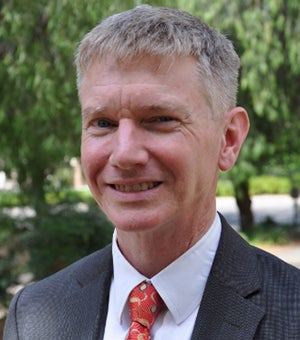
Online webinar platforms like Zoom, Google Meet, and Microsoft Teams have enabled public discourse at an unprecedented scale. But when hundreds of people join a meeting, the flow of feedback—often reduced to rapid-fire chat messages—becomes chaotic and overwhelming.
Kevin Esterling, a public policy and political science professor at UC Riverside, believes there’s a better way.
Leading a team at UCR’s Laboratory for Technology, Communication and Democracy, or TeCD-Lab, Esterling has developed Prytaneum, an artificial intelligence-powered online meeting platform designed for webinar presenters to understand the insights and perspectives of all audience members.
“In large online meetings, it’s impossible to track what everyone thinks,” Esterling said. “Zoom and similar platforms weren’t built with democratic engagement in mind. They’re one-way streets—someone talks, others listen. But in a democracy, the conversation needs to go both ways.”
The new platform draws inspiration from ancient Athens, where civic leaders gathered in the Prytaneum, a hall symbolizing public wisdom, to debate issues. In much the same way, UCR’s Prytaneum platform aims to elevate online engagement by giving every participant—not just the loudest—a voice.
Prytaneum uses artificial intelligence alongside a social media-like interface to guide group discussions at scale. Organizers can pose questions through survey prompts, to which participants respond via multiple-choice or free-form text. The AI then synthesizes responses, highlighting common themes and ensuring the different perspectives in the audience are heard.
This format allows a speaker to get a real-time sense of the audience’s sentiment and the reasoning behind different perspectives—even from a crowd of hundreds. This eliminates the problem of speakers hearing back from only a few members of an audience.
“In conventional town halls, only the most vocal or available people show up,” Esterling said. “Our platform ensures that everyone gets heard.”
As an example, Esterling pointed to local housing debates about building apartments or other facilities, where homeowners fearing traffic or crime often dominate conversations. Renters, who might benefit most from affordable housing, may not have the time or resources to attend these meetings.
“Even if only a few renters participate in a Prytaneum meeting, their voices are captured, categorized, and considered,” Esterling said. “We’re building tools to reflect all views within a community.”
Prytaneum builds on earlier work by Esterling, supported by the National Science Foundation, that explored how digital tools could enhance representative democracy. That research introduced the idea of “directly representative democracy”—a tech-enabled approach that strengthens two-way communication between citizens and elected officials.
The platform was piloted with the California Mental Health Services Oversight and Accountability Commission, where it gathered community input on school-based mental health services. Support for the project has come from the Democracy Fund, the U.S. Department of Education’s Institute of Education Sciences, and UCR’s own economic development and IT Services programs.
Prytaneum is now a research platform, not a commercial product. Hosting meetings on Prytaneum requires a license, which Esterling’s lab can provide to collaborators. It is slated for broader release later this year. Esterling is currently seeking a corporate partner to make the platform more widely available by supporting marketing, license sales, customer support, and software updates.
Esterling emphasizes the goal isn’t to replace traditional forums, but to supplement them with deeper, data-informed conversation.
“There’s still a place for people to show up and express outrage or passion,” he said. “But when it comes to decision-making, we also need spaces for insight and reflection.”
As agencies, school boards, and city councils navigate complex issues—from mental health and housing to environmental policy—Esterling sees Prytaneum as a practical and scalable tool.
“It’s not about reinventing democracy,” he said. “It’s about finally giving it the tools to truly listen.”
The platform and demonstration videos are currently available at https://tecd-lab.ucr.edu/prytaneum.




